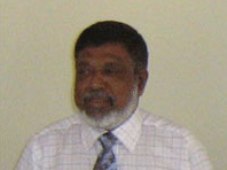The Criminal Court’s suspension of two police lawyers on “ethical grounds” amounts to obstruction of the ongoing investigation into alleged corruption and bribery in parliament, claims Deputy Commissioner of Police Ismail Atheef.
Speaking on Television Maldives last night, Atheef explained that the two lead detectives on the case, Inspector Mohamed Riyaz and Superintendent Mohamed Jinah, appeared in court on July 9, but the letter from Chief Judge Abdullah Mohamed informing police of the suspension was received two days later.
“If someone is in contempt of the court, action has to be taken immediately according to provision five of the court regulations,” he said, adding that the detectives were not given any warning nor had their conduct in court been noted by the journalists who were present.
“So when this letter came to us, the way police interpret it is that this is an obstruction specifically of our investigation,” he claimed.
It was the first time that police officers were suspended from the Criminal Court, said Atheef.
The Deputy Commissioner insisted that the suspension was a deliberate obstruction because Riyaz and Jinah, as the two lead detectives and top police lawyers, would have had to appear at court to seek an extension for Nazim’s arrest.
A court official told Minivan News at the time that details of the suspension could not be provided to the media.
”They were suspended due to a case relating to this code of ethics. It is for more than one reason,” he said.
Obstacles
Atheef stressed that police had a good working relationship with the Criminal Court, but began facing difficulties obtaining court warrants in June 2009 when it began an investigation into alleged corruption in the former Atolls Ministry.
Appearing alongside Deputy Commissioner Atheef, the two police lead detectives on the corruption investigation highlighted procedural difficulties faced in their investigations.
The senior officers expressed concern that investigations into “high-profile corruption cases” were compromised at “a very preliminary stage”.
In some cases, Atheef said, police have heard from the public that warrants have been rejected before receiving an official response from the court.
“The suspect knows we’ve asked for a warrant and have been rejected, so he’s free to do whatever he wants,” said Atheef. “We have to appeal and try to get it again but there’s no point.”
Moreover, in the absence of a Criminal Procedures Act, the officers said, there were no “clear guidelines” on how arrests should be made.
While only the Chief Judge Abdullah Mohamed personally issued warrants at present, Jinah argued that it was neither “practical nor reasonable” for one man to bear the responsibility.
Jinah revealed that the Criminal Court gave evidence police presented to seek an arrest warrant to the defence counsel of detained MPs Abdulla Yameen and Gasim Ibrahim.
“In the criminal justice procedure, disclosure of evidence is a completely different stage,” he said. “This happened way before the threshold test to determine whether or not to prosecute.”
He added that the incident had jeopardised the police investigation.
In some cases, said Inspector Riyaz, the media and supporters of the suspect were present when police arrived on the scene after obtaining a search warrant.
Referring to the case of alleged corruption in the former Atolls Ministry, involving MPs Ahmed Nazim and Ahmed “Redwave” Saleem, Riyaz pointed out that Criminal Court was inconsistent in issuing warrants.
“In a case involving two suspects, we requested a travel ban and to check their bank statements,” he said. “But [the court] enforced a travel ban on one and allowed us to check his bank statement. And for the other, [the court] allowed us to get his bank statement but refused to enforce a travel ban.”
On the importance of detaining suspects, Jinah said stopping communication was crucial to preserve evidence.
Moreover, he added, police did not have to go the Supreme Court to confiscate a suspect’s mobile phone.
Drug bust foiled
Jinah, head of the Drug Enforcement Department (DED), said a Criminal Court official informed police last week that a warrant could not be issued for a case involving a kilogram of illegal drugs.
Distinguishing between routine and targeted enforcement, Jinah explained that expediting search warrants was crucial in the latter case.
“This is completely unacceptable,” he said. “I believe the application for the court order should at least be considered. It’s fine if they considered what was in it and said this can’t be done.”
He added that police summoned the court official who relayed the Chief Judges’ answer but he chose to remain silent.
“Now more than a kilo of drugs has gone into Male’,” he said, adding that the court later issued the warrant but “it was no use to us then.”
As investigating judges was outside the police mandate, said Jinah, police have decided to lodge a complaint with the Judicial Service Commission (JSC) regarding the incident.
